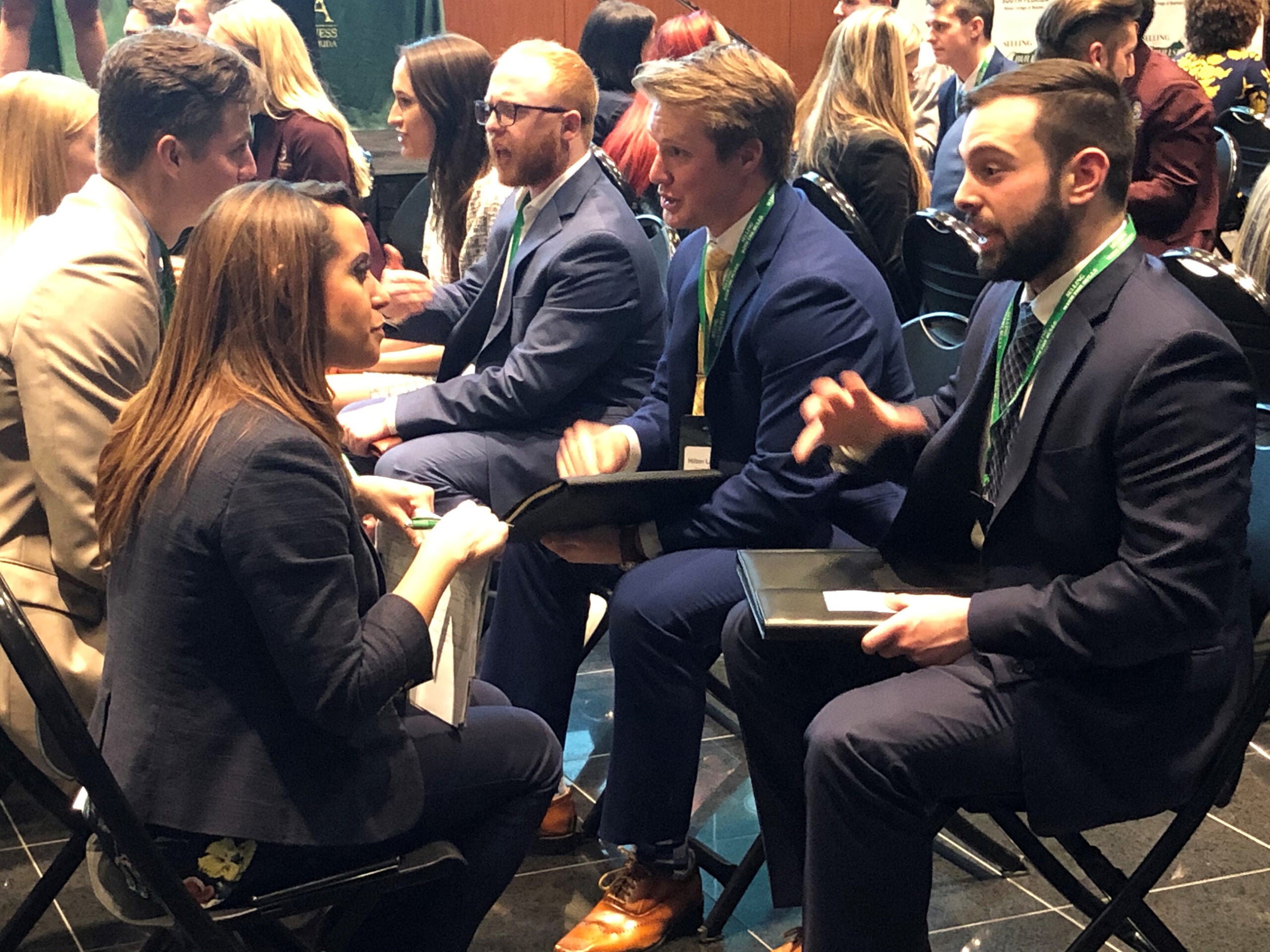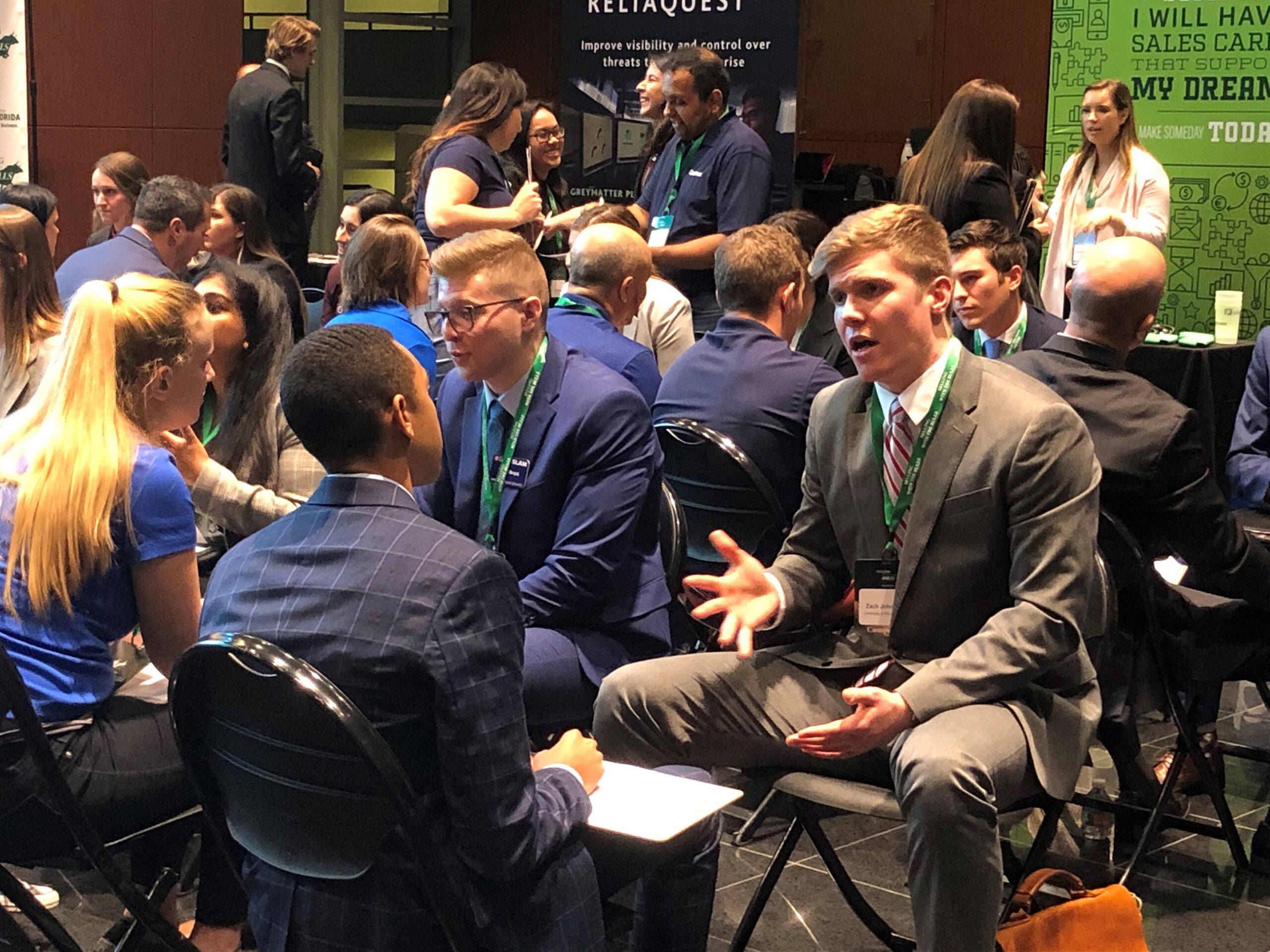KINGSTON, R.I. – Feb. 27, 2020 – The University of Rhode Island’s College of Business recently added a new emphasis on sales education, launching its first sales course in more than two decades and starting a student selling club. But in its first formal competition, the Rhody Rainmakers selling club performed like seasoned salespeople, not newcomers.
The Rhody Rainmakers captured first place at the national Selling with the Bulls competition, hosted by the University of South Florida’s Muma College of Business Feb. 6 and 7 in Tampa. The URI team, comprised of marketing majors Michael Albanese ’20, Kelly Blake ‘21, Ben Grossman ’21, and Zach Johnson ’21, competed against 19 other schools from across the country.
“Considering the club officially launched this semester, it was remarkable and somewhat unprecedented,” said Jonathan Ross Gilbert, part-time faculty and Ph.D. candidate in marketing who founded and coached the team along with volunteer M.J. Miniati ’83. “We’ve had tremendous support from Dean Maling Ebrahimpour and Associate Dean Shaw Chen at the College of Business, and the students sacrificed considerable time to prepare and compete.”

The team award was the result of the students’ performance in an array of individual marketing and sales contests. Albanese captured the overall individual competition in his flight, earning first place in the Cold Call Prospecting, and Quick Pitch events. Johnson placed fifth in the overall, five-round prospecting contest, and Grossman was first in the email portion of the event.
The selling club, which has 30 members, was formed in January with the goal of training students in the science of business-to-business sales and giving them an opportunity to refine their skills through competition. But another important goal is to de-stigmatize the sales profession.
“If you look at surveys about the most ethical professions, low on the list are salespeople,” said Gilbert, a former chief executive officer of a mid-cap communications service provider who teaches the new URI sales class. “People typically think of automobile and insurance salespeople.”
Until recently, sales was mostly ignored as an academic discipline by college and university business programs, he said. But the landscape has changed dramatically. About 150 colleges and universities have sales programs, promoting active research and scholarship. Fueling the change are the growth in business-to-business sales – more complex than consumer sales – and the fact that more than 60% of graduates end up in some form of sales as their first job, many in business-to-business sales.
“The science of business-to-business sales lends itself more readily to academic scholarship and to a higher level of training due to the cognitive nature of complex sales,” he said. “The expectation of the level of technical expertise of sales people has gone up, and the complexity of problem solving has transformed the business-to-business space from primarily transactional outcomes to chiefly relational outcomes focused on co-creating value.”
This semester, URI offered Professional Selling & the Art of Persuasion, as a 400-level elective. Capped at 20 students, the class has filled up. Students are taught the skills needed in business-to-business sales – critical thinking, collaborative problem solving, and relational skills such as selling confidence and empathy. The class puts the pieces together with such exercises as theatrical improvisation. (In fact, the class will have an improvisation showdown this semester with students in a URI acting class.)
“The class is entirely about taking students out of their comfort zone,” Gilbert said.
Albanese, a marketing major from Cranston, has worked in consumer sales for about three years as a top regional knife salesman for Cutco Cutlery. He also runs a Cutco branch office where he recruits, hires and trains salespeople. The class and competition have added to his skills.
“Sales is one of the most rewarding types of jobs in a business,” said Albanese, who hopes to land a sales position in the tech industry. “I think I had a lot of the fundamentals down from the presentations I’ve done with customers. I have the eye contact, the tonality, the pausing, as well as trying to come off as friendly and establishing trust and rapport. But consumer sales and business-to-business sales are totally different. A majority of business sales are asking discovery questions and establishing the buyer’s needs. And for every business customer, it’s different in both senses.”
Johnson, a marketing major from Warwick, became interested in the sales class when Gilbert subbed for one of his professors and described the course. Johnson has sold thousands of dollars in pre-World War II radios and collectible Japanese tin lithograph toy cars on eBay. So, the class piqued his interest.
Selling antiques online and in-person has given Johnson the confidence and attention to detail needed in sales, he said. The judges in Selling with the Bulls contest found him confident and adaptable, but he also found new areas to work on.
“I got some really good feedback. Making eye contact is huge, not being too aggressive in a pitch. It’s more about what I can do for your company and establishing value,” he said.
Albanese finished in the top 12 – out of about 120 competitors – in the Quick Pitch competition, earning first in his group. Students, sitting in 10-person rows, had to impress a sales recruiter across from them before moving on to the next recruiter when the bell sounded.
“You’re screaming at the professional basically trying to make sure that they can hear you. It was pretty intense,” said Albanese, who used his sales experience in his pitch. “The pitch was about a minute and then they asked you questions, gave you feedback or told you about their company. If they thought you were a really good fit, they told you about their sales training program. So, you had to have questions ready for that as well.”
In the Cold Cast Prospecting competition, students acted as a sales representative for the event sponsor, Gartner, a global research and advisory firm that provides research services, consulting and conferences across numerous industry sectors. Students had to convince an “IT executive” – a Gartner representative – to agree to a meeting to discuss attending a Gartner conference. The event had five rounds that included a cold-call email, voicemail, a cold call conversion to secure a meeting, and a 10-minute Skype meeting to sell the executive on the conference.
To prepare for the contest, students researched and analyzed Gartner and its products, determined a number of selling points that would be attractive to various buyers, while also achieving an understanding of the information and research industry, Albanese said.
“For students who are rarely exposed to the inner workings of companies such as Gartner, this is a one-of-a-kind learning experience,” said Gilbert. “It’s a huge cognitive leap to start selling seemingly intangible services such as technology research, and tools. These industries require high-level, complex sales methods.”

